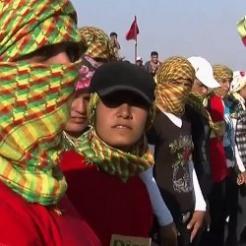International development charities working in Syria have called for diplomacy and dialogue as MPs head to the House of Commons to debate the UK taking military action in Syria.
Parliament has been recalled for an emergency debate on the crisis in Syria at 2pm today. MPs will vote at 10pm tonight on a government motion on taking military action in Syria.
However, the Prime Minister has promised a second Commons vote before Britain supports military action in Syria after Labour and rebel Tory MPs expressed concerns.
A spokeswoman for Oxfam, which has provided support to more than 200,000 Syrians since the start of the conflict, said the charity condemned the use of chemical weapons in Syria, which has prompted Cameron to call for military action. But it called for a political solution to the crisis.
“More than 100,000 lives have been lost and nearly two million people have fled to neighbouring countries. There is a clear risk that Western governments ratcheting up the rhetoric and preparing for military intervention will make the situation worse.
"Instead of focusing on military options and arming parties to the conflict, President Obama, President Putin and other world leaders should put aside their differences and intensify peaceful efforts to stop the bloodshed, before Syria is destroyed and the region further destabilised.”
Jeremy Moodey, chief executive of Embrace in the Middle East, which is supporting Syrian refugees in Lebanon, echoed this view. He told civilsociety.co.uk. “I am cautious about military action. The first port of call must be the United Nations and a proper debate in the Security Council with all evidence of chemical attacks, to muster whether they are being caused by the Syrian regime.
“Every avenue in the UN must be exhausted before military action.”
Cafod, which supports people forced from their homes by the conflict in Syria and delivers aid inside Syria, also expressed caution.
"The attacks last week shocked the world, and it’s easy to see why the government is keen to do something in response," said Anne Street, Cafod’s head of humanitarian policy.
"But in a very complex situation where we know the only solution will be through diplomacy and dialogue, MPs must consider if any military action would serve only to fuel the war and jeopardise the chances of ending it."
Bishop Antoine Audo, the director of Caritas Syria, said: "If there is an armed intervention, that would mean, I believe, a world war. That risk has returned… We hope that the Pope's call for real dialogue between the warring parties to find a solution can be a first step to stop the fighting."
A spokesman for Islamic Relief UK, which is distributing food and medicines inside Syria, and helping hundreds of thousands of refugees in Jordan, Lebanon and Iraq, said: “We do not believe that the international community should stand by while Syria tears itself apart, inflicting huge suffering on millions of people. We therefore welcome the fact that the horrors of this conflict are attracting fresh international attention, with a renewed sense of urgency about protecting civilians.
"It is difficult, however, to predict the consequences of any significant military action in a complex conflict like this one. There is bound to be some risk of the conflict escalating and the humanitarian situation worsening."









